|
|
|
Sort Order |
|
|
|
Items / Page
|
|
|
|
|
|
|
| Srl | Item |
| 1 |
ID:
116365
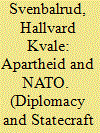

|
|
|
|
|
| Publication |
2012.
|
| Summary/Abstract |
In the 1970s, questions of apartheid and decolonisation rose to the forefront of international political debate. Building on recently declassified, multinational archival research, this analysis assesses the question of whether to impose international economic sanctions against the apartheid regime in both South Africa and white minority-ruled Rhodesia during this decade. The issue of sanctions became a strain on the relationship between Great Britain and the three Scandinavian states-Denmark, Norway, and Britain, were allies within the North Atlantic Treaty Organisation. Wary of communist influence in Africa as well as concerned about protecting their interests on the continent, the British preferred moderate measures and a long-term perspective when dealing with Southern Africa. The Scandinavian Powers, building a reputation as internationalist and progressive states and with few national interests in the area, presented themselves as leading advocates of sanctions against South Africa and Rhodesia. These differences in approach caused recurring tension between the British and their Scandinavian allies, even leading some British officials to suggest sanctioning Norway and Sweden for their Southern Africa policy. However, the end of white minority rule in Rhodesia in 1980 as well as the increasing focus on European security matters during the second Cold War of the early 1980s reduced Anglo-Scandinavian tension over Southern Africa, with the Powers continuing their close relationship throughout and beyond the Cold War.
|
|
|
|
|
|
|
|
|
|
|
|
|
|
|
|
| 2 |
ID:
145525
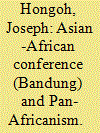

|
|
|
|
|
| Summary/Abstract |
The 1955 Asian-African Conference (Bandung) has been hailed as a turning point in the emergence of the Global South solidarity movement and a pivotal moment in southerners’ collective quest both to liberate themselves from colonialism and to reforge the international order on more inclusive and emancipatory foundations. In this article, the author demonstrates how, in Africa, these aspirations were undermined by nationalist ambitions that privileged self-contained sovereign statehood over potentially more progressive continental solidarity under the Pan-African spirit. The author does so by analysing how the absorption of the Bandung spirit within the Pan-African movement reinforced opportunities for the pursuit of national interests, the affirmation of colonial geographies and economies, and the intensification of forms of solidarities built on the imagined fruits of independence at the expense of a shared history of colonialism. For many African countries, the enduring lessons of the Bandung spirit reside in the challenges of resolving the tensions over the appropriate context for pursuing self-determination and transforming the international order. Thus, while the Bandung spirit delivered the means for newly independent states to engage in international politics through interstate solidarities, it also helped to accelerate the foreclosure of alternative possibilities for intervening in and reshaping the prevailing international order.
|
|
|
|
|
|
|
|
|
|
|
|
|
|
|
|
| 3 |
ID:
053040
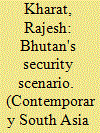

|
|
|
| 4 |
ID:
027851


|
|
|
|
|
| Publication |
Cambridge, Cambridge University Press, 1984.
|
| Description |
xvi, 1011p.hbk
|
| Contents |
Vol. VIII: From c. 1940 to c. 1975
|
| Standard Number |
0521224098
|
|
|
|
|
|
|
|
|
|
|
|
Copies: C:1/I:0,R:0,Q:0
Circulation
| Accession# | Call# | Current Location | Status | Policy | Location |
| 028008 | 960/CRO 028008 | Main | On Shelf | General | |
|
|
|
|
| 5 |
ID:
176988
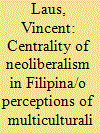

|
|
|
|
|
| Summary/Abstract |
My research focuses on how Filipina/os respond to stigmatisation in Canada and the United States and how those responses are impacted by neoliberal ideology and perceptions of multiculturalism. The research uses in-depth interviews of 58 Filipina/o students in Toronto and Los Angeles to analyse the cultural repertoires available to them that enable or constrain a sense of belonging. Canada offers federally funded multicultural policies toward immigrant settlement and ethnic institutions, compared to the informal approach to multiculturalism in the United States. Nonetheless, the interviewees report that Filipina/os experience stigmatisation on a group level despite efforts to ‘fit in.’ I argue that the dual forces of Western neoliberalism and past colonisation in the Philippines influence tendencies toward either a decolonisation discourse that criticises social structures or a neoliberal discourse that focuses on agency. Perceptions of multiculturalism affect which tendency Filipina/os rely on to mobilise destigmatisation strategies.
|
|
|
|
|
|
|
|
|
|
|
|
|
|
|
|
| 6 |
ID:
157853
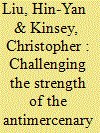

|
|
|
|
|
| Summary/Abstract |
This article questions the prevailing view that there is a strong international norm against mercenary activity. We argue, instead, that international restrictions placed upon mercenaries are the tangential expressions of more basic and pervasive international norms, namely those of state neutrality, the right of peoples to self-determination, and freedom of movement. To buttress our claim, we draw upon documentary evidence specific to critical moments in the norms’ expansion, including the Napoleonic Wars to 1840, the Crimean War, and conflicts of national liberation in the decolonization era. The evidence suggests a broad indifference to mercenaries among policymakers during such pivotal periods. We conclude that the antimercenary norm grounded in moral objections is not as strong as its supporters suggest and often becomes compromised when national interests dictate.
|
|
|
|
|
|
|
|
|
|
|
|
|
|
|
|
| 7 |
ID:
122841
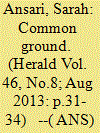

|
|
|
| 8 |
ID:
103858
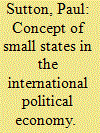

|
|
|
|
|
| Publication |
2011.
|
| Summary/Abstract |
This article examines the literature on small states from the related disciplines of international economics and international politics. By accident and design there is no generally agreed definition and characterisation of small states, although those advanced by the Commonwealth Secretariat and World Bank are most satisfactory. The role of the Commonwealth as a champion of small states is examined. Particular attention is paid to the concept of vulnerability and the challenges and opportunities to small states in a globalised world.
|
|
|
|
|
|
|
|
|
|
|
|
|
|
|
|
| 9 |
ID:
183703
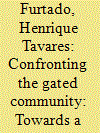

|
|
|
|
|
| Summary/Abstract |
This article investigates the works of Dussel, Maldonado-Torres, and Mbembe as representatives of a tendency in the field of decolonial thought to assume the templates of warfare and the camp as the archetypal registers of violence in the contemporary world. Identifying this focus as the remnant of a Eurocentric vocabulary (the paradigm of war), the article proposes a shift from the language of warfare predominant in the field to a language of welfare. The article turns to the gated community (GC), instead of the camp, and the imperatives of (re)creation, instead of the logics of elimination, as new templates with which to make sense of modern/colonial violence. Moving beyond militaristic imagery, the analysis shows a form of violence that emerges as a response to the endless search for a life of convenience inside the walls of the GC. To this end, the article advances the concept of the dialect of disarrangement, the enforced but uneasy encounter between two subjectivities that inhabit the GC: the patrons (the homeowners who consume the easy life) and servants (the racialised service staff). In the GC, violence emerges in attempts to respond to this (in)convenient encounter via misrepresentations of both patrons and servants as out of their place.
|
|
|
|
|
|
|
|
|
|
|
|
|
|
|
|
| 10 |
ID:
176496
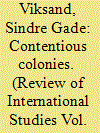

|
|
|
|
|
| Summary/Abstract |
While structural models of empire have recently re-emerged in the theoretical debates in the field of International Relations, a lack of attention has been paid to peripheral actors therein. This is particularly true for the analysis of the peripheries’ relations with polities outside the imperial structure of which the peripheries are a part. In this article, I build a framework to better understand how these extra-imperial ties are translated into peripheral positional power. This framework is constructed on the basis of three core arguments. First, to theorise peripheral power, peripheries need to be positioned in networks outside the imperial structure. Second, the positional power of peripheries depends on the quality of the ties they have to external actors. Peripheries with dense and exclusive ties to external actors are more powerful than those with only sparse and non-exclusive ties. Third, from the different combinations of density and exclusivity arise not only variations in positional power, but also the likely strategies that are engaged in forming alliances with external actors. These logics are illustrated through the study of two cases of the diplomacy of decolonisation: the American Revolutionary War and the Angolan War of Independence.
|
|
|
|
|
|
|
|
|
|
|
|
|
|
|
|
| 11 |
ID:
178253
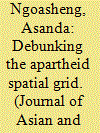

|
|
|
|
|
| Summary/Abstract |
Traditional universities are often interrogated on their pedagogic underpinnings, while universities of technology are often left unchallenged on knowledge production. Universities of technology are often assumed to be transformed because they are a post-apartheid creation, with a mainly black, working-class student body. This assumption has led to little interrogation of the university of technology and its relationship with knowledge production. This paper explores the nature of curriculum contestation and reform at a university of technology. It outlines the historical context of a university of technology and its approach to curriculum development, which has implications for current curriculum transformation efforts. Using autoethnographic research methodology, the paper tracks a multi-year journey towards the development of a transformative, socially just curriculum intervention in the extended curriculum programme for the Architecture and Interior Design programme at a university of technology. The paper concludes that curriculum change does not happen in a vacuum, that it is political, difficult and emotionally taxing, and that it is best done in collaboration with different education stakeholders.
|
|
|
|
|
|
|
|
|
|
|
|
|
|
|
|
| 12 |
ID:
027909
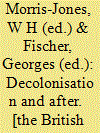

|
|
|
|
|
| Publication |
London, Frank Cass, 1980.
|
| Description |
xvii, 369p.Hbk
|
| Series |
Studies in Commonwealth Politics and History
|
| Standard Number |
0714630950
|
|
|
|
|
|
|
|
|
|
|
|
Copies: C:1/I:0,R:0,Q:0
Circulation
| Accession# | Call# | Current Location | Status | Policy | Location |
| 019296 | 909.0971241/DEC 019296 | Main | On Shelf | General | |
|
|
|
|
| 13 |
ID:
120420
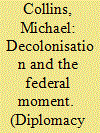

|
|
|
|
|
| Publication |
2013.
|
| Summary/Abstract |
Post-1945 decolonisation involved the universal acceptance of nation-statehood as the alternative to imperialism. Nationalism vanquished its transnational competitors, notably imperialism and Marxism. Alternatives to imperial rule that avoided sovereign states on national lines, such as federations in the later 1940s and 1950s, have received less attention from historians. Federations involved alternative ways of thinking about sovereignty, territoriality, and political economy. British interest in creating federations, for example the Central African Federation (CAF) in 1953, offers some new perspectives on the strength of imperial ideology and the determination to continue a missionary imperialism after the Second World War. Federal thinking and practice was prominent at this time in other European empires too, notably the French and Dutch ones. The federal idea was also an aspect of the emerging European community. This is suggestive of a wider "federal moment" that points to the importance of linking international, trans-national, imperial, and world historical approaches.
|
|
|
|
|
|
|
|
|
|
|
|
|
|
|
|
| 14 |
ID:
192308
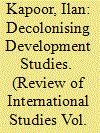

|
|
|
|
|
| Summary/Abstract |
This article explores ways of decolonising Development Studies by: (1) examining the discipline’s tendencies towards what some have called ‘imperial amnesia’, that is, proclivities towards disavowing if not erasing European colonialism, most evident in 1950s–1960s Modernisation theory, but also more recently in the work of such analysts as Bruce Gilley and Nigel Biggar; (2) considering the opportunities and perils of ‘epistemic decolonisation’, that is, ways of decolonising knowledge production in the discipline, including the limits of ‘non-Eurocentric’ pedagogies; and (3) reflecting on forms of material decolonisation (e.g., the reduction of socioeconomic inequalities by improving better access to education or resisting the corporatisation of publicly funded research) that need to accompany any epistemic decolonisation for the latter to be meaningful.
|
|
|
|
|
|
|
|
|
|
|
|
|
|
|
|
| 15 |
ID:
151497
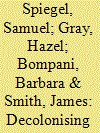

|
|
|
|
|
| Summary/Abstract |
Academics in high-income countries are increasingly launching development studies programmes through online distance learning to engage practitioner-students in low-income countries. Are such initiatives providing opportunities to critically tackle social injustice, or merely ‘mirroring’ relations of global inequality and re-entrenching imperial practices? Building on recent scholarship addressing efforts to ‘decolonise development studies’ and the complex power dynamics they encounter, we reflect on this question by analysing experiences of faculty and students in a United Kingdom-based online development studies programme, focusing particularly on perspectives of development practitioner-students working from Africa. We discuss barriers to social inclusivity – including the politics of language – that shaped participation dynamics in the programme as well as debates regarding critical development course content, rethinking possibilities for bridging counter-hegemonic development scholarship with practice-oriented approaches in a range of social contexts. Our analysis unpacks key tensions in addressing intertwined institutional and pedagogic dilemmas for an agenda towards decolonising online development studies, positioning decolonisation as a necessarily unsettling and contested process that calls for greater self-reflexivity.
|
|
|
|
|
|
|
|
|
|
|
|
|
|
|
|
| 16 |
ID:
188839
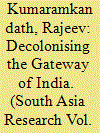

|
|
|
|
|
| Summary/Abstract |
This article interrogates how a colonial monument, the Gateway of India in Mumbai, former Bombay, continues to carry and be endowed with a title that is a misplaced embodiment of Indian social histories. Built in the 1920s, this monument, definitely a work of architectural grandeur, continues to carry its erroneous rendition and confines India’s vast social histories to the colonial moment, with an anglo-centric focus. As the monument symbolises the memory of the colonial regime, it also signifies its oppression as well as its exit from the subcontinent, rather than witnessing anyone coming to India, except King George in 1911, as the monument’s title seems to suggest. A mnemonic device of colonialism, this misleading label needs to be seriously revisited, for it not only romanticises the colonial past but also fails to lead our memories back to certain crucial episodes in earlier social histories, from which the monument and its specific place, Mumbai, are more or less fully absent.
|
|
|
|
|
|
|
|
|
|
|
|
|
|
|
|
| 17 |
ID:
192307
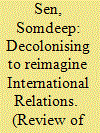

|
|
|
|
|
| Summary/Abstract |
Seeing as colonialism is ubiquitous to where International Relations (IR) comes from, what it explains and who it represents, many have argued that the decolonisation of the discipline is impossible. However, in this agenda-setting introduction, I place decolonisation squarely in the realm of possibility and ask, ‘what would a decolonised field look like?’. In answering this question, the contributions in this forum take point of departure from varied sites within the discipline, as they seek to materialise real change that reimagines what IR is and does as a discipline that was established as a scholarly defence for colonialism. Herein they propose decolonisation as a structure that upends the discipline’s colonial epistemological roots, rethinks core concepts and underlines the need to forefront geographies, peoples, and perspectives that were underrepresented in a colonial discipline. Equally, they recognise that decolonisation is a messy affair, that takes a non-linear trajectory. However, seeing as colonialism did not just inflict material impoverishment but also sought to alienate the colonised from their sense of self, this messiness is only expected. So, rather than be discouraged by this, this forum views the non-linear trajectory to be an unavoidable facet of any attempt at decolonising the discipline.
|
|
|
|
|
|
|
|
|
|
|
|
|
|
|
|
| 18 |
ID:
052792
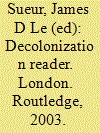

|
|
|
|
|
| Publication |
London, Routledge, 2003.
|
| Description |
x, 462p.
|
| Standard Number |
0415231167
|
|
|
|
|
|
|
|
|
|
|
|
Copies: C:1/I:0,R:0,Q:0
Circulation
| Accession# | Call# | Current Location | Status | Policy | Location |
| 048341 | 325.3/SUE 048341 | Main | On Shelf | General | |
|
|
|
|
| 19 |
ID:
172418
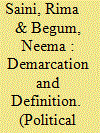

|
|
|
|
|
| Summary/Abstract |
Decolonisation of the curriculum is a burgeoning yet controversial project of radical change, gaining slow but steady traction in higher education politics departments across the country. At its heart is the acknowledgement and systematic unravelling of colonial and imperial practices in the UK university system. This article pins down what decolonisation is and is not, highlighting the barriers and tentative opportunities to effective decolonisation work. This is discussed in the context of the structural constraints that critical scholars of race—particularly those at the intersection of marginalised racial and gender identities—work against in the academy.
|
|
|
|
|
|
|
|
|
|
|
|
|
|
|
|
| 20 |
ID:
074528
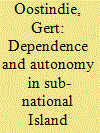

|
|
|
|
|
|
|
|